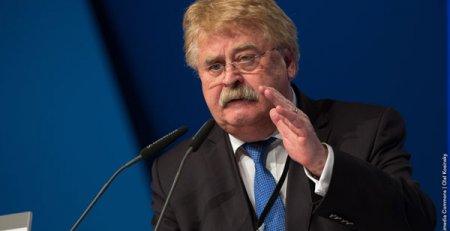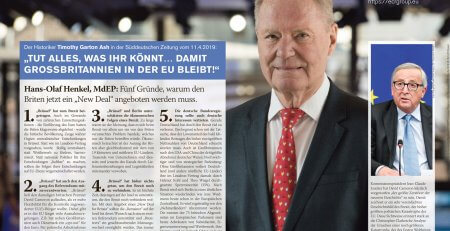Henkel doubts on German-French alliance
OMFIF
by David Marsh in London
Wed 24 Jan 2018
German productivity slipping in euro drive
Productivity and competitiveness in Germany are slipping under a gradual process of European Union ‘harmonisation and centralisation’ aimed at shoring up the euro and bridging the economic gap with France and other members of the single currency.
That was the message from Hans-Olaf Henkel, former president of the Federation of German Industries, in a series of OMFIF meetings in London discussing his campaign to keep Britain in the EU. Henkel said the euro was too weak for Germany’s requirements. This ‘sweet poison’ was holding back German companies’ efficiency, since they were profiting unduly from export orders during the world economic upswing.
Germany, formerly number two in the European league table for productivity, had fallen to number nine, Henkel claimed.
Elaborating on a near-insoluble triangular dilemma running through Europe, Henkel said Germany should place pressure on the European Commission to introduce more flexibility in areas like immigration, prevent British EU withdrawal and keep France from dominating Europe. Germany ‘does not wish to be left alone with the French’, Henkel opined.
Henkel’s narrative diametrically contradicts those in France who argue powerfully that Germany is profiting economically from de facto European hegemony.
Although Henkel acknowledges that his bid to keep the UK in the EU is highly unlikely to succeed, his views strike a chord across the political spectrum. On 23 January he held talks in London with politicians calling for a ‘hard Brexit’ as well as those wishing Britain to stop the withdrawal process and hold a second referendum over whether or not to leave.
He encountered strong opposition from supporters of the France-German partnership, with one telling him that France was ‘excited’ by the possibility of a new deal between Paris and Berlin on deepening euro area integration.
Henkel, a member of the European parliament, has been a controversial backer of the far-right Alternative for Germany (AfD), now in the Bundestag and on track to become the formal German opposition under plans to reforge a grand coalition between Chancellor Angela Merkel’s conservatives and the Social Democratic Party. Henkel quit the AfD with some of the party’s other MEPs in protest about its rightward shift. He now sits in the European parliament for an alliance of liberals and conservative reformers.
Henkel’s analysis is more provocative than many in the German mainstream, particularly his outspoken views on the euro. He is among a battery of plaintiffs whose case again the European Central Bank’s quantitative easing is still going through the German constitutional court, which in August asked the European Court of Justice for its opinion on key matters. This process will take months to resolve.
Yet Henkel’s questions about Germany’s underlying economic performance echo doubts of many in industry and among conservative politicians. They are disturbed about the lack of economic reform under Merkel and a big potential switch towards consumption and redistribution under preliminary policies advanced for the Berlin coalition.
Henkel’s thinking is also broadly similar to that displayed by leading German economists at a conference organised by the Bundesbank and the International Monetary Fund in Frankfurt on 18 January. They included Ludger Schuknecht, chief economist at the German finance ministry, who said low interest rates orchestrated by the ECB had buoyed Germany’s apparently healthy budgetary position excessively.
Schuknecht said on 18 January that, far from practising austerity as its many policy detractors claim, Germany had been behaving in a Keynesian manner. He termed Germany’s much-reputed ‘fiscal space’, as alleged by the IMF and others seeking more expansionary German fiscal policies, ‘an illusion’. Controversially, Schuknecht suggested that if Germany took the wrong steps, the budget surplus could disappear quickly in a similar way to Spain’s rapid fall from grace after the 2008 financial crisis.
Photo: Fotolia.com | Autor: euregiocontent










Schreibe einen Kommentar